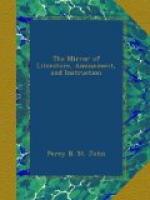“Through Berkeley’s roofs
that ring
Shrieks of an agonized king!”
Yet as your correspondent, J.S. seems of the intelligent kind, he may be in possession of some authority to which he can refer, and thereby prove it is not merely an assertion inadvertently given, to increase the interest of his Visit to Corfe Castle. Knowing your wish that the pages of your entertaining Mirror should reflect the truth, the insertion of this will oblige your Constant Reader,
W.
* * * * *
LINES WRITTEN IN A CHURCHYARD.
(For the Mirror.)
Why am I here?—Thou hast
not need of me,
Home of the rotting and the rotten dead—
For thou art cumber’d to satiety,
And wilt be cumber’d—ay, when
I am fled!
Why stand I here, the living among tombs?
Answer, all ye who own a grassy bed,
Answer your dooms.
Thou, massy stone! over whose heart
art thou?
The lord who govern’d yonder giant place,
And ruled a thousand vassals at his bow.
Alack! how narrow and how small a space
Of what was human vanity and show
Serves for the maggot, when ’tis his to
chase
The greatest and the latest of his race.
One of Earth’s dear ones, of
a noble birth,
Slumbers e’en here; of such supernal
charms,
That but to smile was to awaken mirth,
And for that smile set loving fools in arms.
The grave ill balances such living worth,
For here the worm his richest pasture farms,
Unconscious of his harms.
Yon grassy sod, that scarcely seems
a grave,
Deck’d with the daisy, and each lowly flower,
Time leaves no stone, recording of the knave,
Whether of humble, or of lordly power:
Fame says he was a bard—Fame did not
save
His name beyond the living of his hour—
A luckless dower.
’Tis strange to see how equally
we die,
Though equal honour be unknown to light,
The lord, the lady of distinction high,
And he, the bard, who sang their noble might,
Sink into death alike and peacefully;
Though some may want the marble’s honour’d
site,
Yet earth holds all that earthliness did slight.
P.T.
* * * * *
ANCIENT BOROUGH OF WENDOVER.
(For the Mirror.)
This borough sent members to parliament in the 28th of Edward I. and again in the 1st and 2nd of Edward II.; after which the privilege was discontinued for above three hundred years. “The intermission, (says Britton,) was attended by the very remarkable circumstance of all recollection of the right of the borough having been lost, till about the period of the 21st of James I. when Mr. Hakeville, of Lincoln’s Inn, discovered by a search among the ancient parliament writs in the Tower, that the boroughs of Amersham,




